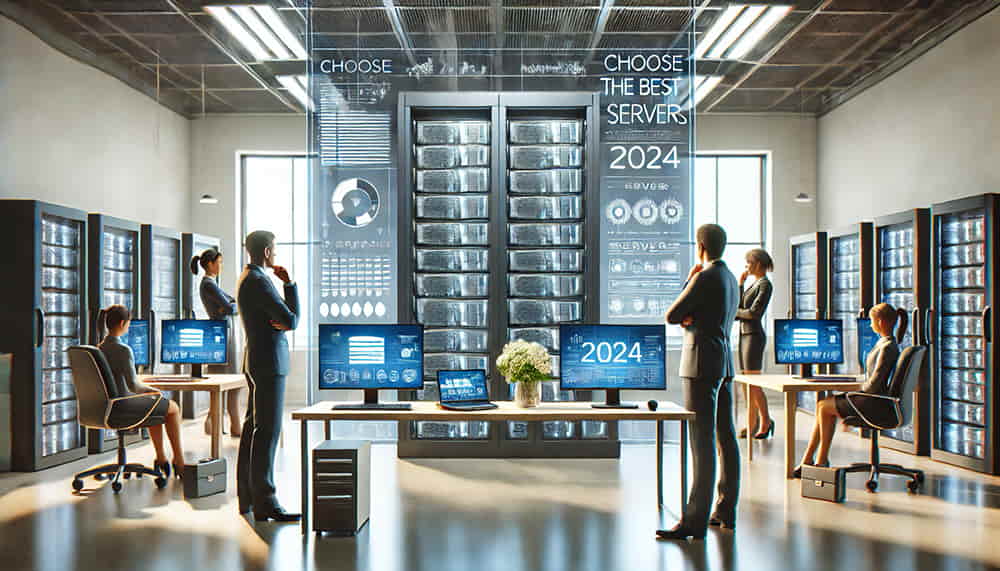Choosing the right server is one of the most important technology decisions for any business in 2024. The server chosen must meet both current needs and anticipate future ones, ensuring the security, efficiency, and scalability that the market demands. In this guide, we’ll discuss the types of servers available, key considerations when selecting them, and how to maintain system security and performance.
Types of Servers: Which One Is Right for Your Business?
Choosing a server largely depends on the type of business, data volume, and specific processing needs. Below, we’ll review the main types of servers and their features.
Dedicated Servers
Dedicated servers are physical machines used exclusively by one business. These offer complete control over configuration and hardware, which is ideal for businesses with intensive processing and security needs.
Advantages:
- Full control over hardware and software.
- Greater security and optimized performance.
Disadvantages:
- High initial costs.
- Need for physical maintenance and specialized personnel.
This type of server is ideal for critical applications and companies with high customization and resource requirements.
Virtual Servers (VPS)
Virtual Private Servers (VPS) provide a more economical alternative to dedicated servers, while offering more control than a shared server. It is a dedicated portion of a physical server, suitable for growing companies.
Advantages:
- Lower cost than a dedicated server.
- They offer good scalability without requiring new infrastructure.
Disadvantages:
- Resources are shared with other VPS within the physical server.
- Variable performance depending on server load.
This type of server is ideal for SMEs that need flexibility and performance at a reasonable cost.
Cloud Servers
Cloud servers are one of the most popular options in 2024 due to their flexibility and pay-as-you-go. They are ideal for businesses looking for scalability without committing to hardware purchases.
Advantages:
- Virtually unlimited scalability.
- Pay-per-use, reducing initial infrastructure costs.
Disadvantages:
- Dependency on Internet connectivity.
- Long-term costs may be higher due to scalability.
Cloud servers are perfect for businesses with variable demand or looking to avoid direct hardware management.
Key Considerations When Choosing a Server
When evaluating which server is right for your business, it’s essential to consider several technical aspects that determine the performance and scalability of your infrastructure.
Storage Capacity
Storage is critical to ensuring fast access to data and keeping applications up and running:
- SSD or NVMe Drives: By 2024, solid-state drives (SSD) or NVMe solutions have become the standard for servers, offering fast access times and better performance compared to traditional hard drives.
- Hybrid Storage: Some businesses may opt for a combination of SSDs for critical data and hard drives (HDDs) for less important data, balancing performance and cost.
Adequate storage capacity ensures that the business can handle both its current needs and future increases in data volume.
Processors and RAM
Processors and RAM determine the server’s ability to handle tasks and applications:
- Processor (CPU): Modern servers feature multi-core CPUs such as Intel Xeon and AMD EPYC processors. These processors are designed to support intensive workloads, from web services to artificial intelligence applications.
- RAM: The amount of RAM depends on the type of applications. In 2024, a minimum of 32 GB is recommended for small servers and scale up to 64 GB or more if virtualization or work with large databases is required.
Scalability and Flexibility
Ensuring that the chosen server can grow with the company is key to avoiding future performance problems:
- Expansion slots: Dedicated servers typically have multiple slots to add memory, additional storage, or processors.
- Compatibility with cloud services: The possibility of integrating a physical server with the cloud allows for a hybrid architecture, ideal for quickly adapting to new load demands without the need to purchase new equipment.
A scalable infrastructure is essential for companies with short- or medium-term growth expectations.
Server Security and Maintenance in 2024
Security risks increase as businesses handle more data and services online. In 2024, server security and maintenance requires a proactive approach.
Backup Solutions
Backup solutions are essential for business continuity:
- Local and Cloud Backups: Maintaining backups both locally and in the cloud ensures data recovery even in the event of physical disasters.
- Backup Frequency: For critical systems, it is recommended to perform daily incremental backups and a full copy at least weekly.
Backup solutions should also be tested regularly to ensure that data recovery is effective when needed.
Cybersecurity Measures
Server cybersecurity is a priority that should not be underestimated:
- Firewalls y sistemas de detección de intrusos (IDS): Los firewalls, combinados con IDS, proporcionan una primera línea de defensa contra ataques externos.
- Actualización y gestión de parches: Mantener el servidor actualizado con los últimos parches de seguridad reduce la vulnerabilidad a ataques. Un servidor con software desactualizado es un objetivo fácil para cibercriminales.
- Acceso controlado y autenticación: Utilizar autenticación multifactor (MFA) y limitar el acceso administrativo a personal autorizado ayuda a prevenir accesos no autorizados.
En 2024, la seguridad de los datos y la resiliencia frente a ataques son componentes esenciales para garantizar la operatividad continua de cualquier infraestructura empresarial.
Conclusión: El Mejor Servidor para Tu Empresa en 2024
Elegir el mejor servidor para tu empresa en 2024 depende de una cuidadosa evaluación de las necesidades actuales y futuras, así como de los recursos financieros disponibles. Si tu empresa busca control total y tiene una infraestructura establecida, un servidor dedicado podría ser la mejor opción. Para las pymes, un VPS o un servidor en la nube puede ofrecer la flexibilidad necesaria sin los altos costos de mantenimiento físico.
Por otro lado, las soluciones híbridas, que combinan la infraestructura local con la nube, ofrecen un equilibrio perfecto para empresas que buscan seguridad, control y capacidad de escalabilidad. Independientemente del tipo de servidor elegido, siempre será fundamental considerar la capacidad de expansión, la seguridad y el soporte adecuado para mantener la infraestructura optimizada y resiliente frente a los desafíos tecnológicos de un mundo cada vez más digital.







